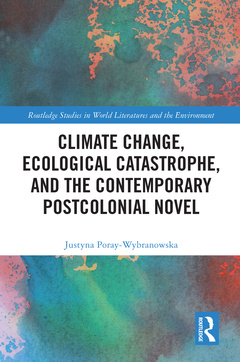Climate Change, Ecological Catastrophe, and the Contemporary Postcolonial Novel Routledge Studies in World Literatures and the Environment Series

Climate Change, Ecological Catastrophe, and the Contemporary Novel responds to the critical need for transdisciplinary research on the relationship between colonialism and catastrophe. It represents the first sustained analysis of the connection between colonial legacy and present-day ecological catastrophe in postcolonial fiction. Analyzing contemporary South Asian and South Pacific novels that grapple with climate change and catastrophe, environmental exploitation and instability, and human-nonhuman relationships in degraded environments, it offers a much-needed corrective to dominant narratives about climate, crisis, and the everyday.
Highlighting the contributions of literary fiction from the postcolonial South to the growing field of the environmental humanities, this book reconsiders the novel?s relationship with climate change and the contemporary environmental imaginary. Counter to dominant current theoretical discourses, it demonstrates that the novel form is ideally suited to literary and imaginative engagements with climate change and ecological catastrophe. The six case studies it examines connect contemporary ecological vulnerability to colonial legacies, reveal the critical role animals and the environment play in literary imaginations of post-catastrophe recovery, and together constellate a decolonial perspective on ecological catastrophe in the era of climate change. Drawing on the work of Indigenous authors and scholars who write about and against the Anthropocene, this book displaces conventional ways of thinking about the relationship between the mundane and the catastrophic and promotes greater dialogue between the largely siloed fields of postcolonial, Indigenous, and disaster studies.
Introduction
Chapter 1: Reading Catastrophe through Postcolonialism, Ecocriticism, and Animal Studies
Chapter 2: Catastrophe, Vulnerability, and Human Relationships
Part 1: Kiran Desai’s The Inheritance of Loss
Part 2: Kim Scott’s Benang: From the Heart
Chapter 3: Catastrophe and Human-Nonhuman Relationships in Degraded Environments
Part 1: Uzma Aslam Khan’s Thinner than Skin
Part 2: Alexis Wright’s Carpentaria
Chapter 4: Land Justice, Resistance, Recovery
Part 1: Amitav Ghosh’s The Hungry Tide
Part 2: Patricia Grace’s Potiki
Conclusion
Justyna Poray-Wybranowska holds a PhD in English and World Literature from York University, with a specialization in environmental humanities, postcolonial studies, disaster studies, and animal studies. The research on which this book is based was jointly funded by the Social Sciences and Humanities Research Council of Canada and by York University. Poray-Wybranowska’s research has been published in ISLE: Interdisciplinary Studies in Literatureand Environment (2020), Shifting Grounds: Cultural Tectonics along the Pacific Rim (2020), Otherness: Essays and Studies (2016), Studies in Canadian Literature (2014), HARTS & Minds (2014), and Just Politics? (2014).
Date de parution : 08-2022
15.2x22.9 cm
Date de parution : 12-2020
15.2x22.9 cm
Mots-clés :
Climate Change; Human Nonhuman Relationships; Ecocriticism; Hungry Tide; Colonialism; Postcolonial Environments; Ecological catastrophe; Disaster Studies; Environmentalism; Ecological Vulnerability; Animal Studies; Contemporary Postcolonial; Weik Von Mossner; Slow Violence; Postcolonial Studies; UN; Long Term Environmental Degradation; Nonhuman Animals; Tide Country; Cho Oyu; Project Tiger; Rainbow Serpent; Indian Forest Act; Nonhuman Turn; Apocalyptic Fiction; Animal Studies Scholarship; Disaster Fiction; Indigenous Studies



